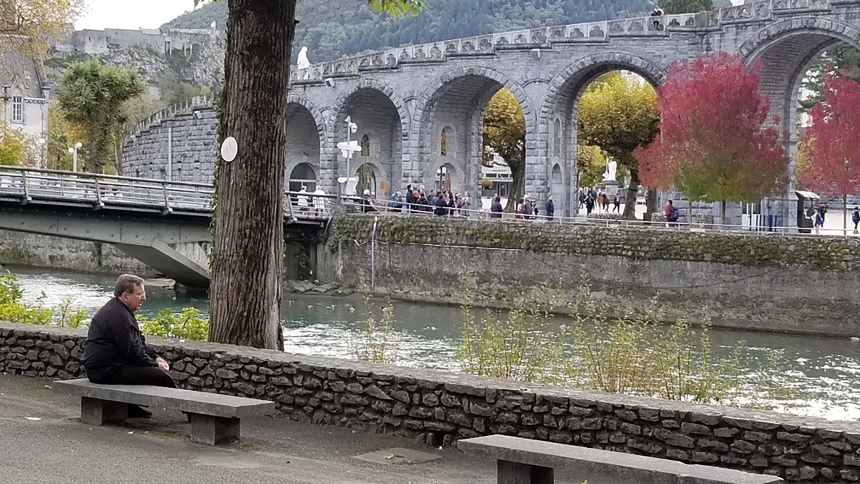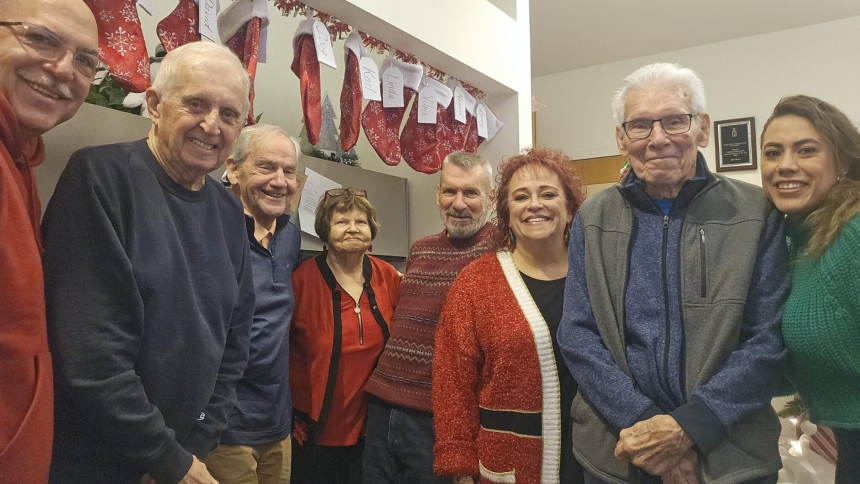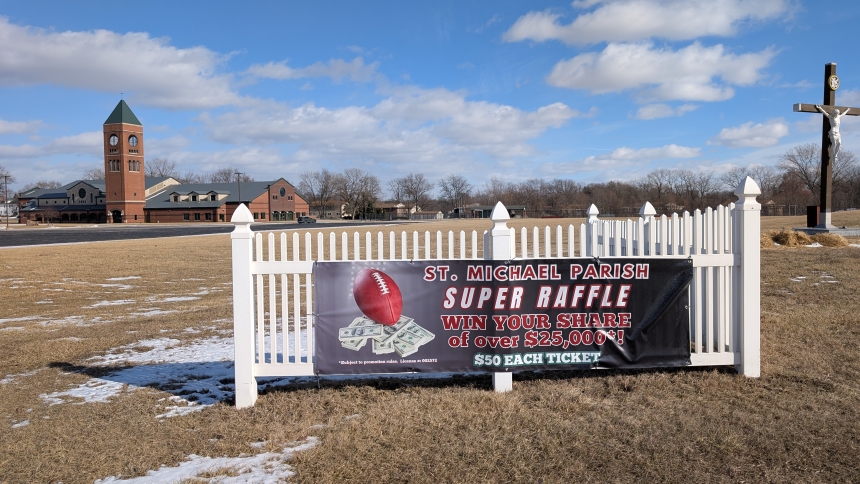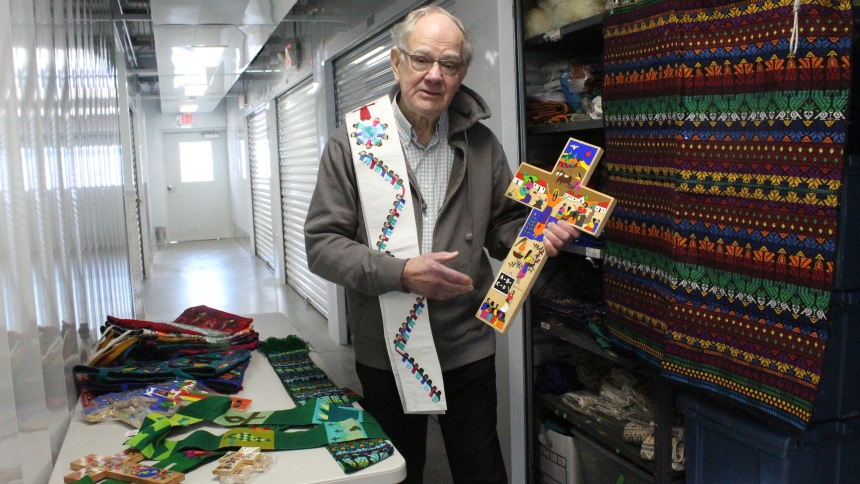
“I think from the earliest moments I knew I was a Catholic,” said Bishop Robert J. McClory. “I can’t recall a time when I didn’t believe that to be true. I imagine that is one of the graces of baptism and being raised in a very strong Catholic family.”
The fact that the faith was not just imparted to him through baptism but reinforced and nurtured through loving parents and a loving family environment is what started the bishop on the path to priesthood.
Having two uncles who were priests in the family always made the priesthood very accessible to him. They would be present at major family gatherings and stay at his house so they would often have Masses in the home.
“At the time I took it as somewhat normal, but I realize now that is a rare privilege because most people don’t have priests in their families,” he said.
While some priests might say they were called to the priesthood from a very young age, Bishop McClory described his discernment process as more of a gradual unfolding.
“It’s easier for me to reflect on how I grew in my love of Jesus and my trust in God than the stand-alone question of when did priesthood enter into that,” he added.
“For me, it was a deepening of my trust in God, my acknowledging Jesus as my brother and Savior, and a deeper sense of the Holy Spirit in my life that intensified in a way that made me open to a calling,” he said.
Bishop McClory acknowledges perhaps the Lord was calling him in his young adult years. After he had been admitted to Columbia University and before he secured housing, he met a priest during a Catholic youth conference who noted there was room in their rectory. He accepted the offer to stay there and was grateful for their openness to host him.
“At that time, I thought maybe God was giving me a big hint … that of all the places I could be living in New York City, here I am living in the rectory of a Catholic church in Spanish Harlem,” he said. “So, I did open myself up to the possibility that the Lord might be calling me to the priesthood.”
McClory completed his master's in public policy and administration and, still not feeling a particularly strong call to the priesthood, moved back home from New York to study law at the University of Michigan. During his second year, his thoughts about the priesthood grew.
“My prayer was ‘Lord if this is your will for me, make it the desire of my heart,’” he shared. “That was a good prayer that opened new pathways for me.”
During this time, McClory was involved with various parish ministries including young adult groups, youth groups and retreats. He began to notice that the work that he was involved with during his spare time was fulfilling. As those feelings intensified, he began to wonder “What if my whole life was centered on doing this – being configured to God but also living out that vocational call?”
“I began to think about what that would be like if I was to give everything to the Lord in the priesthood,” he said. “And I began to see that it would be a life well lived, not without hardship or sacrifices, but that would be a life well lived.”
Bishop McClory was 30 years old when he entered the seminary. Although he experienced questions and uncertainty before it, once he made the decision he experienced a sense of great joy and satisfaction.
“I felt like it was the right place for me to be,” he said. “Even surprising to me, given the intensity of the discernment process, once I finally did it, I felt like I was skiing downhill. It was right where the Lord wanted me to be.”
Bishop McClory feels blessed that he entered Sacred Heart Major Seminary in Detroit with a class that has continued to maintain strong relationships. During the past 25 years, those with ties to the seminary from that year remain committed to gathering for dinner every month.
“I wound up having another lawyer in my class when I entered the seminary in Detroit, and when I went to Rome there were three of us in my class. So, what struck me as somewhat unusual became a source of some solidarity as we had a similar background.”
Bishop McClory also continues to see classmates he studied with at the Pontifical North American College in Rome. Over the past twenty-five years, they have kept the tradition of annual class reunions.
“I feel very blessed that I’ve had good brothers in the ministry. In scripture, we read that iron sharpens iron. I think that means that we really kind of shape and form each other. When you invest in those relationships of fraternity and solidarity over time, it’s a great source of support.”
He continued, “I think the fraternity that I had in my seminary in Detroit and my seminary in Rome was very encouraging and is still a big part of my priestly identity.”
During his studies in Rome, Bishop McClory was granted the privilege of giving tours of St. Peter’s Basilica, and not just only of the main level. He was trained and granted permission to serve as a guide to the excavations underneath called the “Scavi.”
“That was part of my seminary experience and part of my ministry, because you weren’t just pointing out facts and figures and dates of things, but you could use all of that to weave a historically accurate narrative of what went into the excavations,” he said. “The point of that grand basilica was that Peter was real. He gave his life in defense of the truth that he had seen the Risen Christ. It’s not about a building, but it’s about Jesus and it’s about Peter.”
“That was a great way to have my seminary experience be blended into sharing the faith with others,” he said. “To be able to give those tours and at the end lead them in prayer, and some of them in tears and overwhelmed and saying it was life-changing was beautiful. I really enjoyed having that ministerial apostolate.”
After being ordained in May 1999, Father McClory spent summer of parish ministry in Detroit, and then returned for a year as a student priest in Rome. When he arrived back in Detroit full-time, he said it was a joy to “be dedicated to ministry and being immersed in the life of the parish.”
“You go through a formation process on the way to the priesthood. Then, once you’re ordained, you are formed in a new and different way,” he said. “You discover that people’s lives present themselves in need and so you’re responding to where they are. Their needs might be different than you expected. ”
In a way, priests are formed by their parish, he said, admitting that his own formation continues to this day.
“Coming to the Diocese of Gary has brought forth in me a need to respond to the needs of our community here and to respond to what the faithful have expressed are their desires as well as what I think the Lord has given to me to do,” he said.
Bishop McClory’s experience comes from a blended ministry, having taught in the seminary and having multiple responsibilities within diocesan leadership as chief of staff in Detroit. Those roles were coupled with other forms of pastoral outlets.
In one instance, Bishop McClory served as pastor of a small African American parish, Presentation/Our Lady of Victory, which required of him “an openness to a culture other than the one I was raised in, a sensitivity to the Black experience in the Church, and the warmth and joy of a culture that is very family-centric and very deeply connected to faith.”
“I tried to learn from that community how to serve,” he said. “Within that small parish, there was a heightened expectation for longer preaching because the Word was very central, and I came to appreciate even more the importance of family. The more I could give examples from my own family situation, the more that seemed to connect.”
Reflecting on how he approached the role of pastor, he said, “I try to bring people together. I try not to be a lone ranger in the parish or the diocese. I try to respect the insights of others and to empower them as they want to share their gifts.”
He added he often calls to mind the word that Pope Francis uses which is “accompaniment,” that describes how Catholics are to walk with each other in life situations, learning about the gifts and questions of one another.
“I think I’ve tried to lead but do so with a sensitivity to involving others around me,” said Bishop McClory. “We have outstanding laity in the Church in the United States who have talents and skills in their faith formation, and I’ve been blessed to be surrounded by some really good lay coworkers over the years.”
Bishop McClory truly loves being a priest and encourages those considering a priestly vocation to “take it to prayer,” and talk with a trusted priest.
“You give up a lot but what you get back is so much more,” he said. “It’s not a boring life, but a life of great fulfillment.”
Caption: Then-Monsignor Robert McClory spends a moment at the Shrine of Our Lady of Lourdes in France in October 2019. (Photo courtesy of the Archdiocese of Detroit)



